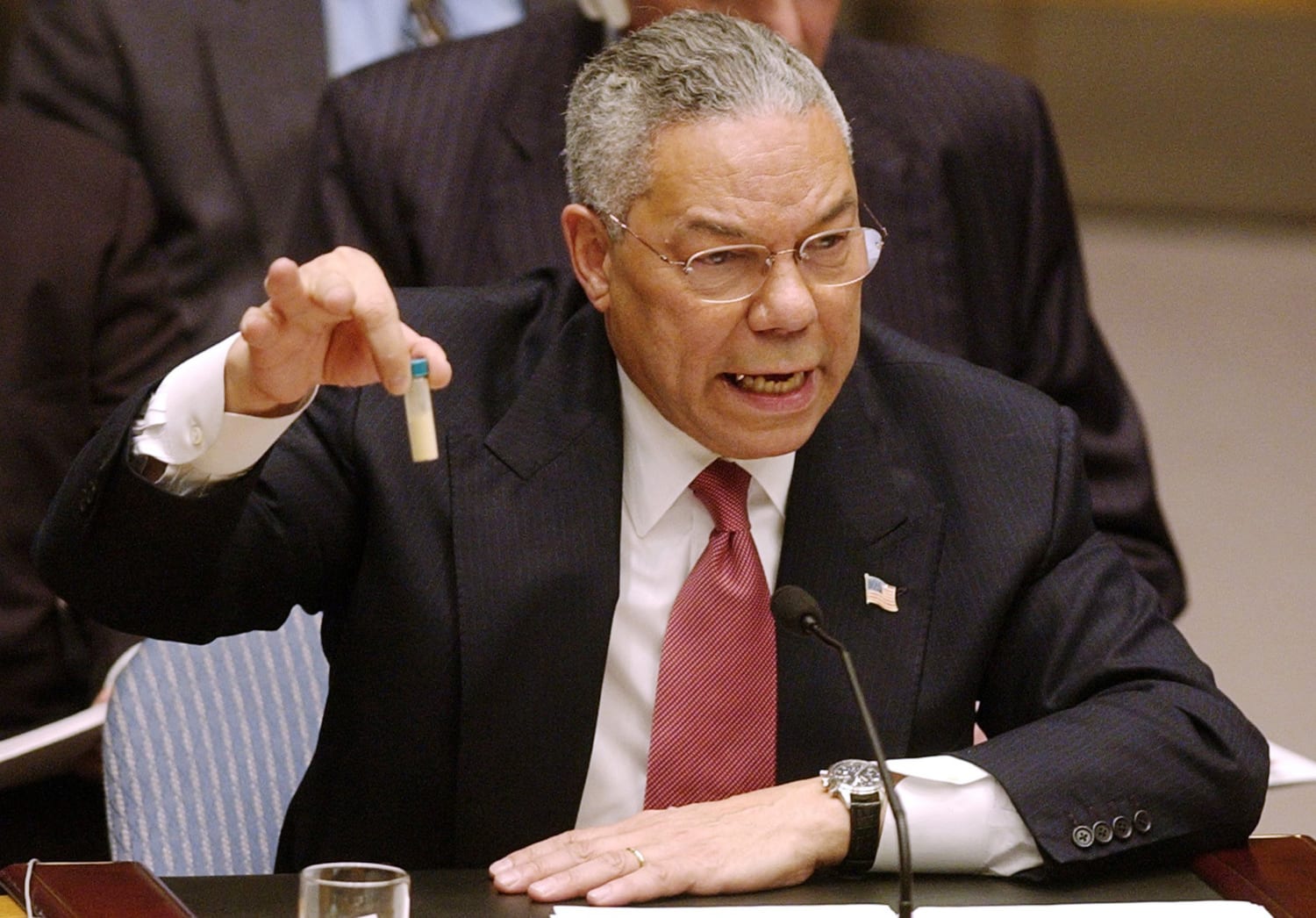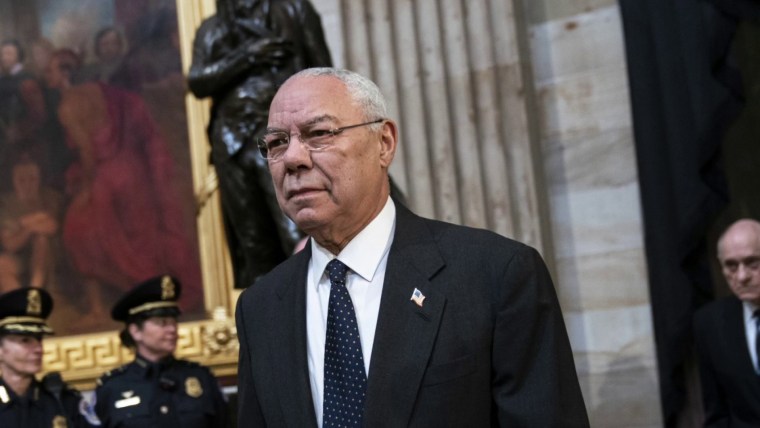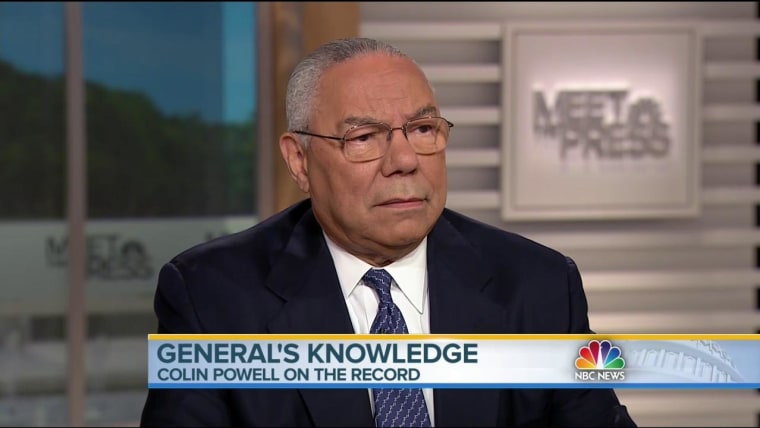BAGHDAD — While Americans mourned Colin Powell as a soldier and a statesman, in Baghdad he was praised for helping liberate Iraq from a despot but also condemned as an “engineer” of a bloody war that was launched on a lie.
For many Iraqis, Powell will forever be tied to the 80-plus minute speech he delivered to the United Nations on Feb. 5, 2003, in which he laid the groundwork for the invasion of Iraq based on false claims that dictator Saddam Hussein had amassed weapons of mass destruction.
“Colin Powell is the engineer of the U.S. invasion of Iraq,” said Ahmed Falah Hassan, 54, a lawyer in Baghdad after Powell’s death was announced on Monday. “He is the one who defended the false accusations by the United States that Iraq had weapons of mass destruction, showing false evidence to the whole world.”
That invasion, Hassan said, didn’t just dislodge Hussein, it destabilized the entire region, splintered Iraq in sectarian warfare, emboldened Iran and helped bring about the Islamic State terror group.
“Most of the Iraqis wanted to get rid of Saddam Hussein because he treated people badly, but the invasion allowed all these political parties to control the country, which resulted in the handing over of Iraq over to Iran,” Hassan said.
Ali Mohsin, 48, a retired Baghdad primary school teacher, also shed no tears for Powell.
“Our religion prevents us from feeling joy about the death of someone, even if this person was an enemy,” Mohsin said. “But did Powell ask for forgiveness before dying for the crimes he committed against my people? Because of his lies, hundreds of thousands were killed, during the invasion or as a consequence of this brutal action.”
Powell and the Bush Administration he served as Secretary of State in were false liberators, he said.
“Powell, as well as all those who were behind the invasion, are responsible for the death of Iraqis since 2003 until now, because they worked hard not to change Saddam Hussein, but to serve the interests of their own colonial countries,” he said.
Manal Hussein, who is 52 and retired from her job in the Ministry of Agriculture, disagreed somewhat with Mohsin.
“They said that Powell was the reason behind liberating Iraq,” the Baghdad woman said. “I use the word liberate, not invade, because he and the American administration did the right thing when they decided to get rid of Saddam Hussein.”
“We lived for 35 years under the dictatorship of a brutal person who found happiness in killing my people,” she said.
While it is true that Iraq did not have weapons of mass destruction, Manal Hussein said, “Saddam had to be removed in one way or another.”
“Even if Powell used false facts and lies, Saddam had to be removed,” she said.
In London, Renad Mansour, project director of the Iraq Initiative at Chatham House, a think tank, said Powell’s legacy “is mixed.”
“He was part of an American war machine that went abroad to fight wars in Afghanistan and Iraq, resulting in the deaths of hundreds of thousands of civilians and the trauma of countless more,” Mansour said. “The result was more instability in the region, not the democracy that he and the Bush administration promised.”
These failed wars also did significant damage to the U.S. standing as a world power, he said.
“While Powell was often considered one of the more moderate officials inside the Bush Administration, he nonetheless was part of an America that lost international sway due to colossal failures abroad,” said Mansour.
Powell, who was 84 and had cancer when he died Monday of complications from Covid-19, said he regretted giving that U.N. speech and conceded it would “always be part of my record.”
But David Phillips, director of the Program on Peace-building and Human Rights at Columbia University, defended Powell as an “American patriot” who “made the mistake of following the Bush Administration’s diktats.”
“When he was putting together his presentation for the U.N. Security Council, he and his staff triple-checked all the sources. He didn’t simply take the word of the CIA,” Phillips said. “So he ultimately presented what he believed to be the truth. It’s important when considering Colin Powell’s legacy that he isn’t simply defined by a U.N. Security Council presentation which, in the end, proved not to be true.” (Phillips has been an analyst with NBC News and is a former senior adviser to the State Department.)
Anthony Cordesman, an expert on U.S. foreign policy at the Center for Strategic and International Studies, said of Powell, “In many ways he was blamed for something that was the fault of other people.”
“The problem he was faced with is the intelligence that he was given, and in fact the world was given, basically, was based on people who had strong political motives to go to war and did not reflect an accurate picture of what was happening in Iraq,” Cordesman told NPR. “And these same people sharply understated the risk of what would happen after Saddam fell.”
Khalid Razak reported from Baghdad, Corky Siemaszko from New York and Saphora Smith from London.
Source: | This article originally belongs to Nbcnews.com











